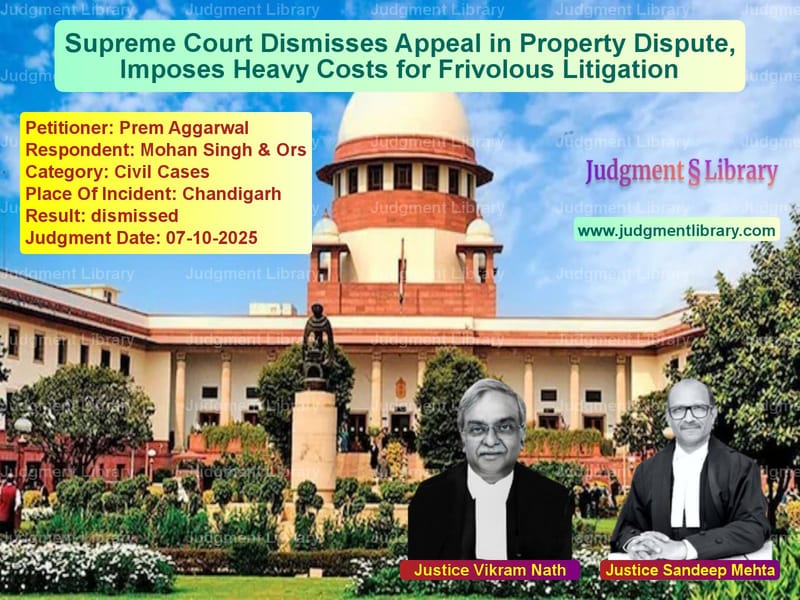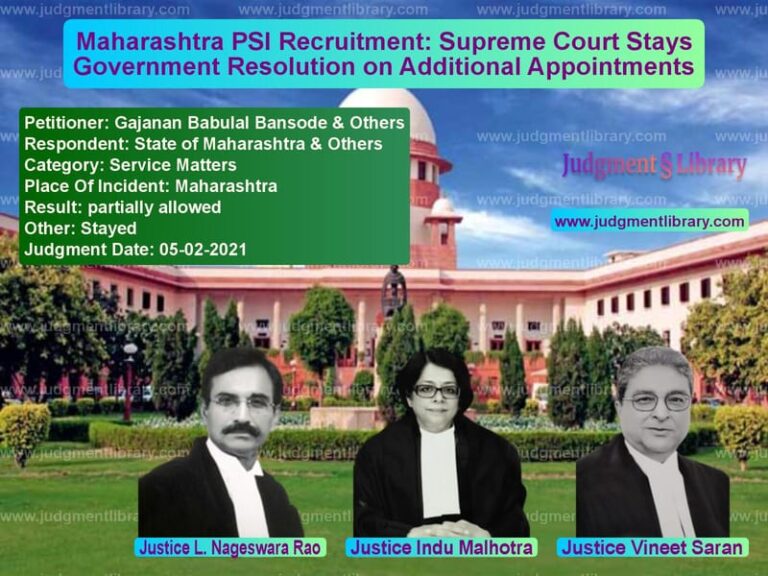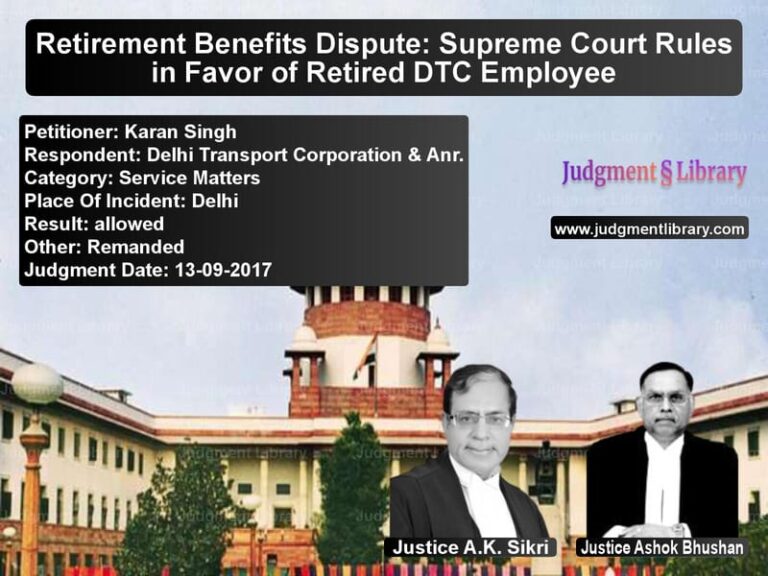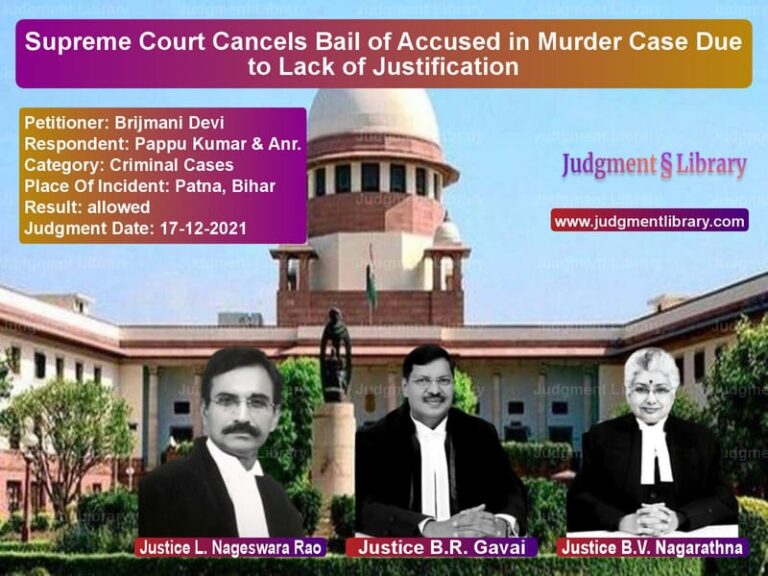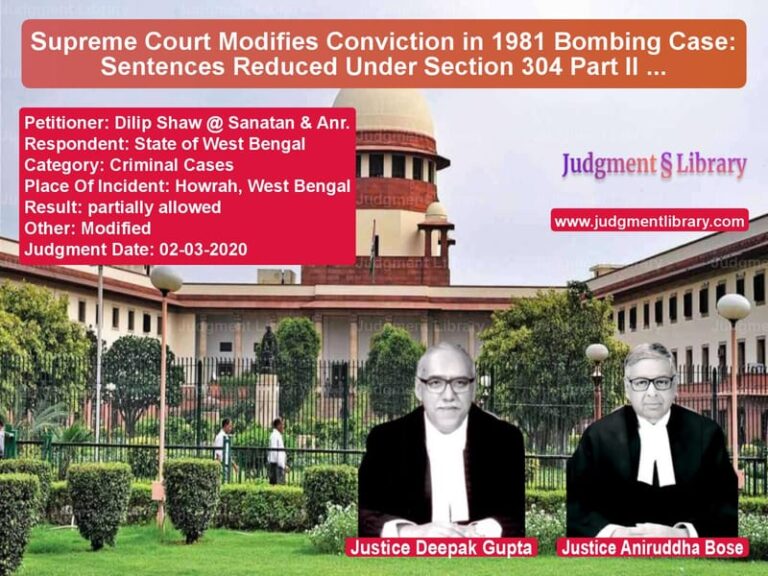Supreme Court Dismisses Appeal in Property Dispute, Imposes Heavy Costs for Frivolous Litigation
In a strongly worded judgment that serves as a cautionary tale about the misuse of legal processes, the Supreme Court of India recently dismissed an appeal that sought to delay the inevitable execution of its own earlier order. The case, which spanned over 36 years, involved a property dispute where the appellant had been trying to hold on to possession of a property while simultaneously refusing to accept a massive compensation award of ₹2 crores against an initial earnest money payment of just ₹25,000. The Court’s stern observations and imposition of heavy costs highlight the judiciary’s growing intolerance towards litigants who attempt to exploit legal technicalities for unjust enrichment.
The Long Legal Battle
The origins of this protracted legal battle date back to June 12, 1989, when an agreement to sell was executed between the parties for a property with a total sale consideration of ₹14,50,000. The appellant had paid ₹25,000 as earnest money and was given possession of the ground floor of the property, which was vacant at that time. The first floor had two tenants. What followed was a series of legal proceedings that would stretch across more than three decades.
The appellant first filed a suit for permanent injunction in February 1990, seeking to restrain the respondents from alienating or dispossessing them from the suit property. This suit was dismissed as withdrawn on June 15, 1990, and attained finality. Shortly thereafter, in June 1990, the appellant filed another suit seeking specific performance of the 1989 agreement to sell. This suit was decreed by the Trial Court in December 2009, a decision that was upheld by the first appellate court in September 2013 and the High Court in May 2022. The respondents’ review petition was also dismissed in August 2022.
However, the tide turned when the respondents approached the Supreme Court. The Court, in its judgment dated April 1, 2025, allowed the respondents’ appeals and dismissed the suit for specific performance, primarily on the finding that it was barred under Order II Rule 2 of the Code of Civil Procedure. The Court noted that both the suit for injunction and the suit for specific performance were based on the same cause of action – an advertisement for sale published in January 1990. Despite dismissing the suit, the Supreme Court molded equitable relief by directing the respondents to pay ₹2 crores to the appellant within three months, a sum that was 800 times the original earnest money of ₹25,000.
The Execution Proceedings and Resistance
What happened after the Supreme Court’s judgment is what prompted the Court’s strong reaction in the present appeal. The respondents tried to make the payment of ₹2 crores to the appellant, but the appellant refused to accept it. The respondents then initiated execution proceedings and deposited the amount by way of Fixed Deposits in the appellant’s name. The Executing Court directed the appellant to accept the amount and hand over possession, but when this didn’t happen, the respondents applied for issuance of warrants of possession.
The Executing Court, in its order dated August 7, 2025, noted that the amount had been furnished by way of Fixed Deposit and directed that warrants of possession be issued. When the Bailiff attempted to execute the warrants, he faced resistance and reported that police assistance was required. The appellant then filed objections to recall the warrant of possession, which were rejected by the Executing Court on August 12, 2025. The Court granted four days’ time to the appellant to receive the amount and hand over possession, failing which the warrants would be executed with police assistance.
Aggrieved by these orders, the appellant approached the High Court through a civil revision, which was dismissed on September 11, 2025. The present appeal was filed against this dismissal.
The Supreme Court’s Strong Observations
The Supreme Court began its judgment with some of the strongest language seen in recent judicial pronouncements. Justice Vikram Nath, writing for the bench, stated: “Some litigants, it seems, cannot take yes for an answer. After this Court on 1st April, 2025 set aside the decree but moulded equitable relief by directing payment of ₹2,00,00,000/ (Rupees Two Crores), a sum 800 (eight hundred) times the ₹25,000/- (Rupees Twenty Five Thousand only) paid as earnest money in 1989, the appellant refused the tender, obstructed execution, and has returned to this Court in an effort to delay the inevitable.”
The Court further observed: “This appeal is a cautionary tale about how the pursuit of a windfall can turn the process of law against those who seek to exploit it, in order to retain possession while spurning an extraordinary monetary award. The appellant has shot himself in the foot and in the same breath dug his own grave. Equity will not allow unjust enrichment. The process of execution exists to give effect to judgments and not to underwrite windfalls. A party that has received such compensation must yield possession.”
The Mathematical Reality and Equitable Considerations
The Court provided a detailed mathematical analysis to demonstrate the extraordinary nature of the compensation awarded. It calculated what the appellant would have received at different interest rates over 36 years:
At 9% interest: ₹81,000
At 18% interest: ₹1,62,000
At 24% interest: ₹2,16,000
At 36% interest: ₹3,24,000
Compared to these amounts, the ₹2 crores awarded by the Court was described as “a whopping amount” that was given to “suitably compensate” the appellant for the 36-year period that had passed since the agreement.
The Court explained the rationale behind this compensation: “This Court had awarded the amount of Rs. 2,00,00,000/- (Rs. Two Crores only) to the appellant to ensure that the suit property of the respondents continues with them and at the same time balance the equities between the parties. The appellant who had won from three Courts and a period of 36 years had passed since the time of execution of the agreement is suitably compensated.”
Legal Arguments and Their Rejection
The appellant’s senior counsel, Mr. Siddharth Bhatnagar, argued that the appellant was entitled to the benefit of Section 53-A of the Transfer of Property Act, 1882, and being in possession of the suit property, was entitled to continue till there was a decree of eviction. He contended that the respondents having failed to claim possession before the Supreme Court, the only recourse open to them was to file a separate suit for possession.
The Court rejected this argument outright, stating: “The submission advanced by Mr. Bhatnagar does not merit consideration as the very claim of possession was based on the agreement to sell and the suit for specific performance having been dismissed by this Court with an exorbitant amount of compensation being awarded to suitably compensate him, he cannot enjoy the possession and at the same time receive the amount of Rupees Two Crores as against an advance amount of Rupees Twenty Five Thousand Only.”
The Court further noted that the appellant had lost both the suit for permanent injunction and the suit for specific performance, and therefore could not claim to hold on to possession or insist that the respondents file a separate suit for possession.
The Principle of Actus Curiae Neminem Gravabit
The Court invoked the legal maxim “actus curiae neminem gravabit”, which means that the act of the Court shall prejudice no one. The Court explained: “It is founded on the equitable notion that no party should suffer owing to an error, delay, or inadvertence attributable to the Court itself. The Court, acting as in appendage of justice, cannot permit its own procedure or inadvertent lapse to occasion injustice. Accordingly, where a party has been disadvantaged by reason of an act of the Court, it is incumbent upon the Court to undo such prejudice and restore the party to the position he would have occupied but for such act.”
The Court quoted from its earlier decision in Jang Singh v. Brij Lal: “There is no higher principle for the guidance of the Court than the one that no act of Courts should harm a litigant, and it is the bounden duty of Courts to see that if a person is harmed by a mistake of the Court he should be restored to the position he would have occupied but for that mistake.”
Applying this principle, the Court held that the omission in its earlier judgment to specifically mention that possession should be handed over should not prejudice the respondents, and the Court had the duty to correct this inadvertent lapse.
Conclusion and Costs
The Supreme Court dismissed the appeal with costs quantified at ₹10,00,000 (ten lakhs) to be paid by the appellant to the respondents within four weeks, failing which it would carry interest at 12% per annum. The Court directed that proof of payment of costs be filed within six weeks, failing which the matter would be listed for appropriate orders.
This judgment sends a strong message to litigants who attempt to misuse legal processes for unjust enrichment. The Court’s willingness to impose heavy costs for frivolous litigation and its clear articulation of the principles of equity and justice make this a significant precedent in Indian jurisprudence. The case demonstrates that while courts are generous in molding relief to do complete justice, they will not tolerate attempts to exploit this generosity for windfall gains at the expense of rightful owners.
Petitioner Name: Prem Aggarwal.Respondent Name: Mohan Singh & Ors.Judgment By: Justice Vikram Nath, Justice Sandeep Mehta.Place Of Incident: Chandigarh.Judgment Date: 07-10-2025.Result: dismissed.
Don’t miss out on the full details! Download the complete judgment in PDF format below and gain valuable insights instantly!
Download Judgment: prem-aggarwal-vs-mohan-singh-&-ors-supreme-court-of-india-judgment-dated-07-10-2025.pdf
Directly Download Judgment: Directly download this Judgment
See all petitions in Property Disputes
See all petitions in Specific Performance
See all petitions in Damages and Compensation
See all petitions in Contract Disputes
See all petitions in Judgment by Vikram Nath
See all petitions in Judgment by Sandeep Mehta
See all petitions in dismissed
See all petitions in supreme court of India judgments October 2025
See all petitions in 2025 judgments
See all posts in Civil Cases Category
See all allowed petitions in Civil Cases Category
See all Dismissed petitions in Civil Cases Category
See all partially allowed petitions in Civil Cases Category

